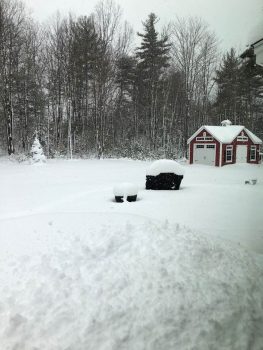French Grammar – Sometimes even être needs a vacation Posted by Tim Hildreth on Mar 13, 2018 in Grammar, Vocabulary
Back in décembre (December) I shared a post about how sometimes the famous “House of être” needs to make room for guests. This week we’re going to look at some examples of the opposite… when verbs that usually take the verb être to from the passé composé switch teams and take the verb avoir.

As discussed back en décembre, with the exception of a small number of verbs, most verbs in French form the past tense with the helping verb avoir. The 17 verbs that take être * are sometimes said to reside in the “house of être” because they all relate to movements and actions in and around the proverbial house. But sometimes even some of those verbs need to get out.
| Français | English | Français | English |
|---|---|---|---|
| Pierre est monté se coucher. | Peter went up(stairs) to go to bed. | Pierre a monté les valises dans le grenier. | Peter took the suitcases up to the attic. |
| Nous sommes descendus à la plage. | We went down to the beach. | Nous avons descendu les caisses à la cave. | We took the boxes down to the basement. |
| Marie est entrée dans la maison. | Marie came into the house. Also Marie went into the house. | Marie a entré le code pour ouvrir la porte. | Marie entered the code to open the door. |
| Jean et Marc sont rentrés de l'école. | John and Mark returned from school. Also John and Mark came back from school. | Ils ont rentré leur velos dans le garage. | They put their bikes (back) in the garage. |
| Monique et Anne sont passées chez nous. | Monique and Anne came by our house. | Elles ont passé un examen d'anglais. | They passed (took) an English test. |
| Je suis sorti(e) de ma chambre. | I left my bedroom. | J'ai sorti mon livre de mon sac-à-dos. | I took my book out of my back-pack. |
Notice how the verbs agree in gender and number with the subject when they are followed by the verb être but not by avoir.
Speaking of vacations,  I could use a little bit of a vacation myself! Jeudi dernier (last Thursday) we had another tempête de neige (snow storm) here in the nord-est (north east). It is certainly not the first time we’ve had de la neige au mois de mars (snow in the month of March) but I think 18 inches of the stuff is more than enough! It is hard to believe that le printemps et Pâques (spring and Easter) are just a few short weeks away.
I could use a little bit of a vacation myself! Jeudi dernier (last Thursday) we had another tempête de neige (snow storm) here in the nord-est (north east). It is certainly not the first time we’ve had de la neige au mois de mars (snow in the month of March) but I think 18 inches of the stuff is more than enough! It is hard to believe that le printemps et Pâques (spring and Easter) are just a few short weeks away.
* The ‘house of être’ really includes more than 17 verbs. The old mnemonic device Dr. & Mrs. Vandertramp is more appropriately Dr. & Mrs. P. Vandertramp. For some reason poor ‘passer’ is often omitted. And the full list also includes many verbs derived from the core list like ‘redevenir’ and ‘renaître’.
** If you want to get really complicated, how is this for different uses:
“Pierre est monté l’échelle.” vs. “Pierre a monté l’échelle.” The first means ‘Peter went up the ladder.” while the second one can either mean “Peter raised the ladder.” or “Peter put the ladder together.” depending on the context!
Free stock photo this week from Ibrahim Asad from Pexels https://www.pexels.com/photo/beach-calm-clouds-idyllic-457882/

Build vocabulary, practice pronunciation, and more with Transparent Language Online. Available anytime, anywhere, on any device.



